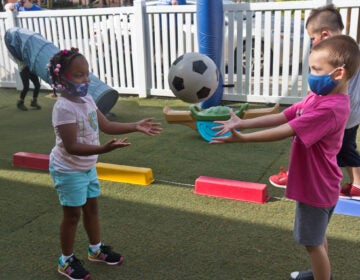Delaware teachers get training on how to spot child abuse virtually
Delaware’s child abuse hotline has seen a dramatic drop in calls now that mandatory abuse reporters like teachers no longer interacting with kids.

(Bongkarn Thanyakij/Pexels)
When it comes to reporting child abuse, people who work as teachers, health care workers among other professions are required to report to authorities if they see evidence that a child is being abused.
But with schools closed for an extended period of time as part of stay-at-home orders, teachers are no longer in frequent contact with their students. It’s much harder to see signs of abuse.
That’s concerning for Patricia Dailey Lewis, executive director of the Beau Biden Foundation for the Protection of Children.
“From the numbers, we know that we don’t have a situation where everyone is happily gathered at home and all child abuse has stopped,” Lewis said.
She said calls to the state’s child abuse hotline dropped more than 50% since stay-at-home orders started.
“For many children, the safest they are is when they’re at school,” Lewis said. “They are generally much safer at school and at youth serving organizations like Boys & Girls Clubs then some of them are at home.”
In non-coronavirus times, the foundation provides training for teachers and others who work closely with children on how to identify signs of abuse. Now, they’re developing training material to help teachers see those signs during virtual meetings with students via video conference applications like Zoom.
One recent caller to the abuse hotline reported a 7-year-old student was attending a Zoom meeting in the dark. When the teacher asked the student to turn on the lights, he said the lights had to be off when his parents weren’t at home.
“That call to the hotline will help put them and those children in a safer place,” Lewis said. “It will help get them what they need to make sure their children are cared for while they work.”
Signs of abuse teachers and others are encouraged to look out for include unexplained injuries, bruising on the torso, ears or neck, changes in behaviors such as anxiety, depression or aggression, or lack of hygiene.
The foundation is raising money through May to continue training teachers and others to know what to look for when they come in contact with kids in-person or online.
“While we understand that people are under stress financially, any little amount people can do really helps us provide care for children by making sure that people that do see them have the tools necessary,” Lewis said.
As schools remain closed for the remainder of the academic year, the foundation is looking to train people who come in contact with kids on a more regular basis while they’re stuck at home.
“That’s all of our delivery people,” she said. “Think about the Amazon guy, or the FedEx woman, they’re looking out more than they have before, because they know, they may be the only eyes on this family, the only eyes on this household.”
Workers in the Delaware Division of Family Services are also using online tools to do more “virtual check-ins” with children in the system. They are performing home visits when necessary and using the proper precautions, including wearing masks.
Karen DeRasmo, executive director of Prevent Child Abuse Delaware said everyone has a role to play to keep children safe.
“While maintaining a safe physical distance is critical right now, providing social support and maintaining connections with family and friends virtually is a great way to reduce stress and feelings of isolation that can lead to child maltreatment,” she said.
Anyone who suspects child abuse or neglect can submit an anonymous report with the state’s online portal iseethesigns.org. The state’s child abuse hotline can be reached any time of day at 1-800-292-9582. There’s also a Crisis Text Line for youth, just text DE to 741-741.
WHYY is your source for fact-based, in-depth journalism and information. As a nonprofit organization, we rely on financial support from readers like you. Please give today.




![CoronavirusPandemic_1024x512[1]](https://whyy.org/wp-content/uploads/2020/03/CoronavirusPandemic_1024x5121-300x150.jpg)


